Is Cannabis A Viable Treatment For ADHD & ADD?
Published :
Aug 30, 2018
Categories :
Medical cannabis

The number of people diagnosed with ADHD is currently on the rise. Researchers are turning to cannabis as a potential alternative to pharmaceutical treatment options.
Every year, millions of people around the world are diagnosed with Attention Deficit Hyperactivity Disorder (ADHD). This mental health condition affects about 6–9% of children and 5% of the adult population globally. With the list of medical conditions cannabis can help alleviate continuing to grow, it appears that ADHD may be a new addition to the roster.
ADHD is often difficult to treat with conventional treatment methods due to significant side effects. Medical cannabis could be a great alternative to provide relief to those suffering from this disorder.
WHAT IS ADHD?
ADHD is a neurodevelopmental disorder characterised by difficulty paying attention, hyperactivity, or difficulty controlling behaviours inappropriate for one’s age. Everyone can find it difficult to concentrate or control impulsive tendencies once in a while, however, for some people, this problem is so persistent and pervasive that it interferes with various aspects of life such as school, work, family, and social interactions. Such individuals are often diagnosed with ADHD as a result.
It is the most commonly diagnosed and studied mental disorder in children and adolescents. Without proper diagnosis and treatment, ADHD may have profound consequences including academic failure, depression, family stress and disruption, relationship problems, delinquency, substance abuse, and job failure. For this reason, early identification and treatment are essential.
There are three types of ADHD. These are predominantly inattentive type, predominantly hyperactive-impulsive type, and combined type ADHD.
• Predominantly inattentive type: This is the disorder commonly referred to as attention deficit disorder (ADD). It is more prevalent in adults than in children. The symptoms of this type include forgetfulness, inability to focus, easy distraction, poor listening skills, and poor organisational skills. Inattentive ADHD can sometimes resemble a mood disorder in adults.
• Predominantly hyperactive-impulsive type: This type encompasses the stereotypical characteristics of ADHD. The symptoms include fidgeting with hands and feet, squirming in seat, difficulty sitting for extended periods, excessive talking, impulsiveness, interrupting others, difficulty waiting for their turn, and feelings of restlessness.
• Combined type ADHD: This type is diagnosed when a person exhibits several symptoms (six or more) of both hyperactive-impulsive and inattentive ADHD.
CAUSES OF ADHD
Despite numerous studies, researchers have yet to determine the exact causes of ADHD. However, researchers have discovered a strong genetic link, with the disorder running in families. Multiple genetic studies provide evidence that ADHD is strongly inherited. Nonetheless, ADHD is a complex disorder, resulting from the interaction of multiple genes.
Scientists also cite some environmental factors as increasing the chances of having ADHD. These include alcohol consumption during pregnancy, exposure to specific toxic substances, extreme premature birth, low birth weight, abuse or extreme neglect, and social deprivation. The evidence is not conclusive, but these factors increase the risk of developing ADHD-like symptoms.
Scientists continue to study the relationship between these environmental factors and the disorder. It is a common assumption that excess sugar, lack of physical activity, and lack of supervision can cause ADHD. There is currently no clinical evidence to support these claims. However, these factors can exacerbate ADHD symptoms in some children.
CURRENT TREATMENT OPTIONS FOR ADHD
The treatment options for ADHD are medication and behavioural therapy. The most widely employed class of medication for the management of ADHD symptoms are psychostimulants. Most ADHD patients respond positively to psychostimulant medication.
It is worth noting that these improvements show up in the short-term. Researchers are still studying the long-term effectiveness of psychostimulant medications. Non-stimulant medications like Atomoxetine are another pharmaceutical treatment option. Non-stimulants are gradual-release medications with slower effects that can last up to one day.
Each patient must weigh the pros and cons of taking medication. They often carry the risk of adverse effects such as hypertension, mood swings, growth problems, numbness, vomiting, nervousness, weight loss—the list goes on. This is the main reason why many people are looking into cannabis as an alternative treatment option.
Behavioural interventions are a significant component of treating people with ADHD. The aim of behavioural therapy is to identify unwanted behaviours, replacing them with desirable ones. The strategies used include positive reinforcement, open communication, involvement, and teaching self-advocacy skills.

HOW CANNABIS CAN HELP WITH ADHD
The potential of cannabis in treating ADHD lies in its effect on dopamine levels in the body. Dopamine is an organic chemical that functions as a neurotransmitter. Researchers have noted that the symptoms of ADHD are associated with a shortage of dopamine in the brain.
Scientists suspect that this is caused by higher concentrations of dopamine transporter in the brain and nervous system. Dopamine transporter is a protein that is involved in the dopamine reuptake. Dopamine is vital for proper cognitive functions such as attention and memory.
Medications currently administered to ADHD patients such as Ritalin and Adderall stimulate the central nervous system, thus improving concentration. These drugs have a number of unwanted side effects. According to Dr. David Bearman, a prominent cannabis researcher, cannabis interacts with dopamine management systems in the brain. As such, it has potential therapeutic value in regards to ADHD symptoms.
Dr. Bearman’s position is that cannabis seems to increase the availability of dopamine, thus producing similar effects to stimulants such as Ritalin. Ritalin and other stimulants bind to dopamine and inhibit its metabolic breakdown. Cannabis employs a different mechanism, but the overall effect is the same.
DOPAMINE DEFICIENCY
Cannabinoids have the potential to address dopamine deficiency in people with ADHD. One study published in May 2017 displays the beneficial effects of cannabis for ADHD. Researchers at King’s College of London administered half a volunteer group with oral cannabis spray, and the other half with a placebo.
Patients who received the cannabis spray exhibited improvements in impulsivity and hyperactivity, as well as other cognitive factors including attention. This is just one of the multiple preliminary studies conducted in the past few years that supports cannabis as an alternative for reducing ADHD symptoms.
For those seeking a different approach to dealing with the symptoms of ADHD, cannabis can be a viable option. However, more research is necessary before clinicians can recommend cannabis for ADHD treatment, especially for children.






































